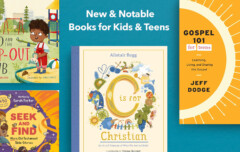This is the first in a series of articles that will examine various doctrinal and societal challenges the evangelical church must face early in the 21st Century. Today we will look at the doctrine of open theism. Future articles will examine the Emerging Church, ecumenism, postmodernism, and a variety of other topics.
Open theism is a relatively new doctrine that has only gained popular prominence since 1994 with the release of the book The Openness of God which was written by five evangelical scholars and edited by Clark Pinnock. What began on the fringes of scholarship has quickly gained a popular following, in part because of the publication of entry-level titles such as Gregory Boyd’s God of the Possible and in part because of the acceptance of the doctrine by various popular authors. While many evangelicals do not embrace this doctrine themselves, they may regard it as an optional doctrine that remains within the pale of orthodox evangelicalism. This article will define the doctrine, describe its chief characteristics, introduce its proponents and explain the challenge to the church.
A Definition
This is a definition I have adapted from Monergism.com. “open theism is a sub-Christian theological construct which claims that God’s highest goal is to enter into a reciprocal relationship with man. In this scheme, the Bible is interpreted without any anthropomorphisms – that is, all references to God’s feelings, surprise and lack of knowledge are literal and the result of His choice to create a world where He can be affected by man’s choices. God’s exhaustive knowledge does not include future free will choices by mankind because they have not yet occurred.”
One of the leading spokesmen of open theism, Clark Pinnock, in describing how libertarian freedom trumps God’s omniscience says, “Decisions not yet made do not exist anywhere to be known even by God. They are potential–yet to be realized but not yet actual. God can predict a great deal of what we will choose to do, but not all of it, because some of it remains hidden in the mystery of human freedom … The God of the Bible displays an openness to the future (i.e. ignorance of the future) that the traditional view of omniscience simply cannot accommodate.” (Pinnock, “Augustine to Arminius, ” 25-26)
Defining Characteristics
Open theism is characterized in several ways:
- God’s greatest attribute is love. God’s love so overshadows His other characteristics that He could never allow or condone evil or suffering to befall mankind.
- Man has libertarian free will. Man’s will has not been so effected by the Fall that he is unable to make a choice to follow God. God respects man’s freedom of choice and would not infringe upon it.
- God does not have exhaustive knowledge of the future. Indeed, He cannot know certain future events because the future exists only as possibility. God is unable to see what depends on the choices of free will agents simply because this future does not yet exist, so it unknowable. In this way open theists attempt to reconcile this doctrine with God’s ominiscience.
- God takes risks. Because God cannot know the future, He takes risks in many ways – creating people, giving them gifts and abilities, and so on. Where possibilities exist, so does risk.
- God learns. Because God does not know the future exhaustively, He learns, just as we do.
- God is reactive. Because He is learning, God is constantly reacting to the decisions we make.
- God makes mistakes. Because He is learning and reacting, always dealing with limited information, God can and does make errors in judgment which later require re-evaluation.
- God can change His mind. When God realizes He has made an error in judgment or that things did not unfold as He supposed, He can change His mind.
The most important thing to note is that God knows the future only as it is not dependent on human, free-will decisions. God does not know what any free-will agents (ie humans) will do, because those decisions do not yet exist and God cannot know what does not exist. God decided, in Creation, that He would limit Himself in this way in order to give complete freedom to human beings. Therefore, God does not know or control the future – He learns from our decisions and constantly adapts as necessary. He often needs to change His mind or re-evaluate His options as the future unfolds.
Chief Proponents
The best-known proponents of open theism are:
Clark Pinnock – Clark Pinnock spent 25 years preaching, teaching, and writing at McMaster Divinity College after having served previously at the University of Manchester, New Orleans Baptist Theological Seminary, Trinity Evangelical Divinity School, and Regent College in Vancouver. He is best-known for his contribution to the book The Openness of God: A Biblical Challenge to the Traditional Understanding of God.
Greg Boyd – Greg Boyd is the Senior Pastor at Woodland Hills Church in St. Paul, Minnesota and previously served as a Professor of Theology at Bethel College for sixteen years. In 2000, Dr. Boyd founded Christus Victor Ministries, a nonprofit organization that promotes faith which satisfies the mind and inspires the heart. Dr. Boyd regularly speaks at academic and religious conferences, college campuses, and churches throughout the United States and abroad. His most popular book is God of the Possible which is a popular defense of open theism.
In Their Own Words
There is no better way of understanding a doctrine than through the words of those who believe and teach it. So let’s turn to some of the prominent Open Theists and hear them in their own words. I will provide brief commentary where appropriate.
We must wonder how the Lord could truly experience regret for making Saul king if he was absolutely certain that Saul would act the way he did. Could God genuinely confess, “I regret that I made Saul king” if he could in the same breath also proclaim, “I was certain of what Saul would do when I made him king?” Common sense tells us that we can only regret a decision we made if the decision resulted in an outcome other than what we expected or hoped for when the decision was made.
Gregory Boyd – God of the Possible, page 56.
Boyd tells us of a God who regrets – a God who sorrows over decisions He has made as He is genuinely saddened by the results of His poor decision.
God makes a covenant with his creation that never again will virtually everything be annihilated. The sign of the rainbow that God gives us a reminder to himself that he will never again tread this path. It may be the case that although human evil caused God great pain, the destruction of what he had made caused him even greater suffering. Although his judgment was righteous, God decides to try different courses of action in the future.
John Sanders – The God Who Risks, page 50.
In this quote we are told that God regrets. God suffered greatly as a result of a decision He made – a decision that may have been rash. It may have been an over-reaction.
I suggested to her that God felt as much regret over the confirmation [of marriage] he had given Suzanne as he did about his decision to make Sault king of Israel. Not that it was a bad decision – at the time, her ex-husband was a good man with a godly character. The prospects that he and Suzanne would have a happy marriage and fruitful ministry were, at the time, very good. Indeed, I strongly suspect that he had influenced Suzanne and her ex-husband [toward] their marriage.
Because her ex-husband was a free agent, however, even the best decisions have sad results. Over time…[he] had opened himself up to the enemy’s influence and became involved in an immoral relationship. Initially, all was not lost, and God and others tried to restore him, but he chose to resist the prompting of the Spirit.
By framing the ordeal within the context of an open future, Suzanne was able to understand the tragedy of her life in a new way. She didn’t have to abandon all confidence in her ability to hear God and didn’t have to accept that somehow God intended this ordeal “for her own good.” … This isn’t a testimony to [God’s] exhaustive definite foreknowledge; it’s a testimony to his unfathomable wisdom.
Gregory Boyd – God of the Possible, pages 105-106.
This has become one of the best-known defenses of open theism and is a story that is told often. God did the best with the information He had at the time and confirmed a woman’s choice of husband. But God was later surprised to see this man prove himself anything but a good husband. God did His best to restore this man, but was unable. God had ultimately made a mistake in confirming Suzanne’s choice of a spouse.
The overarching structures of creation are purposed by God, but not every single detail that occurs within them. Within general providence it makes sense to say that God intends an overall purpose for the creation and that God does not specifically intend each and every action within the creation. Thus God does not have a specific divine purpose for each and every occurence of evil. The “greater good” of establishing the conditions of fellowship between God and creatures does not mean that gratuitous evil has a point. Rather, the possibility of gratuitous evil has a point but its actuality does not. … When a two-month-old child contracts a painful, incurable bone cancer that means suffering and death, it is pointless evil. The Holocaust is pointless evil. .. God does not have a specific purpose in mind of these occurences.
John Sanders – The God Who Risks, pages 261-262.
Quotes like this one were used to comfort a shocked world during the aftermath of the Tsunami of 2004. Many professed Christians denied that God had a hand in this disaster, and that He had foreknowledge of it. According to Open theology, there is no purpose in gratutious suffering and evil, and it occurs outside the will and foreknowledge of God.
It is God’s desire that we enter into a give-and-take relationship of love, and this is not accomplished by God’s forcing his blueprint on us. Rather, God wants us to go through life together with him, making decisions together. Together we decide the actual course of my life. God’s will for my life does not reside in a list of specific activities but in a personal relationship. As lover and friend, God works with us wherever we go and whatever we do. To a large extent our future is open and we are to determine what it will be in dialogue with God.
John Sanders – The God Who Risks, page 277.
This quote emphasizes the reciprocal nature of the relationship between men and God espoused by Open Theists. Humans and God work together to create, know and understand the future. When it comes to the future, God is no further ahead we are and no more responsible for what will happen.
[W]e must acknowledge that divine guidance, from our perspective, cannot be considered a means of discovering exactly what will be best in the long run – as a means of discovering the very best long-term option. Divine guidance, rather, must be viewed primarily as a means of determining what is best for us now.
…
[S]ince God does not necessarily know exactly what will happen in the future, it is always possible that even that which God in his unparalleled wisdom believes to be the best course of action at any given time may not produce the anticipated results in the long run.
David Basinger – The Openness of God, pages 163 & 165.
Basinger tells us that God’s guidance is accurate only for the present – only with a view to the knowledge God currently posesses. Because God does not know the future, His guidance cannot extend beyond the present. Even the best of God’s wisdom can only anticipate results based on current conditions.
Where You Might Encounter open theism
John Eldredge – Though Eldredge denies he is an open theist, the evidence does not support his claim. Time and time again he speaks of God in ways that can only be explained if you hold such views. While the following quotes are taken from Wild at Heart, similar beliefs are expressed in at least one of his other works (The Sacred Romance). “God is a person who takes immense risks” (p. 30). “It’s not the nature of God to limit His risks and cover His bases” (p.31). “As with every relationship, there’s a certain amount of unpredictability. God’s willingness to risk is just astounding. There is definitely something wild in the heart of God” (p. 32).
Gregory Boyd – Boyd’s books are becoming increasingly popular. The doctrine is evident even in the books that do not specifically address open theism.
I have encountered open theism in books written by other lesser-known authors.
Concerns
The chief concerns with open theism are as follows:
- A Denial of Omniscience. While men like Greg Boyd deny that open theism denies God’s omniscience, this is simply not true. Even if it is true that the future exists only as possibilities, something that is not adequately proven by open theists, we are still putting a limit on God’s knowledge when we state that He cannot know these possibilities. This view of God’s knowledge of the future is unique in that it is at odds with every other Judeo-Christian tradition.
- God’s goodness, greatness and glory are at stake. The God of the Open Theists is, in the words of Bruce Ware, too small. He is not the all-knowing, all-powerful God revealed so clearly in the pages of the Bible. Christians need to always be concerned that both they and God are making poor decisions based on inadequate information. Thus we cannot always count on God to do what is best, because even He does not always know what this is.
- The Christian’s confidence in God is at stake. If open theism is true, the Christian cannot put his full trust and confidence in God. “The God of open theism will always want our best, but since he may not in fact know what is best, it becomes impossible to give him our unreserved and unquestioning trust” (Bruce Ware, Their God is Too Small, page 20. When hardships arise we will have to ask if God anticipated these, or if He is as shocked and distressed as we are.
My View
Needless to say, I find this doctrine wholly incompatible with our knowledge of God as presented in His Word. While open theism contradicts the understanding of God in every Judeo-Christian tradition, it is most completely at-odds with the Reformed understanding, which teaches the highest view of God’s foreknowledge and sovereignty. This doctrine undermines our confidence in God and erodes our trust in His promises that He always has our best interests in mind. It is a dangerous, pernicious doctrine. Unfortunately, with it being subtly taught by popular teachers like John Eldredge, it is being introduced to millions of Christians who may come to accept the view of a risk-taking God without understanding the consequences of such a view.
Resources
Pro
Clark H. Pinnock, Richard Rice, John Sanders, William Hasker, and David Basinger. The Openness of God (InterVarsity, 1994). The book that began it all.
Gregory A. Boyd, God of the Possible: A Biblical Introduction to the Open View of God (Baker Book House, 2000). The popular entry-level introduction to the doctrine.
John Sanders, The God Who Risks: A Theology of Providence (InterVarsity Press, 1998). Another popular introduction to the theology.
Con
Bruce A. Ware, God’s Lesser Glory: The Diminished God of open theism (Crossway Books, 2001). A thorough, biblical response to open theism.
Bruce A. Ware, Their God is Too Small: open theism and the Undermining of Confidence in God (Crossway Books, 2003). A condensed, simplified version of God’s Lesser Glory targetted at the layperson.
This page contains a lenghty list of books, articles and speeches defending both sides of the debate. The list was compiled by Justin Taylor.
If you are going to read only one book on the debate, I would recommend Their God is Too Small










